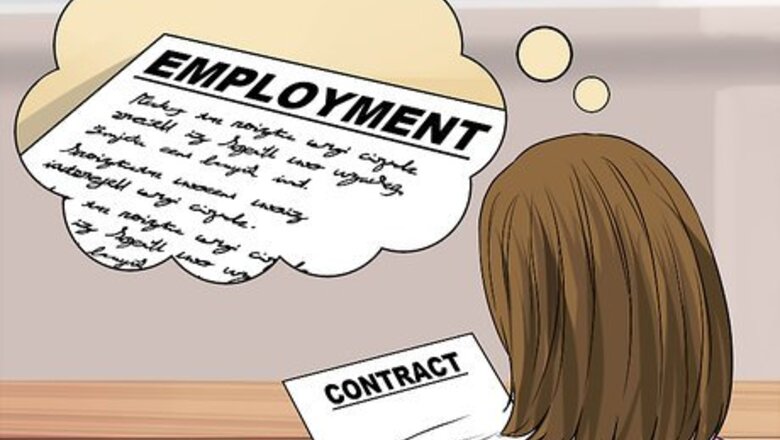
views
Understanding Contract Fundamentals

Determine whether you need a contract. If you are exchanging something of significant value with someone, such as your labor or services, intellectual property, or material goods, you should have a contract in place. For many people, common situations that involve contracts include purchasing a home, selling or buying a car, or beginning employment. Other common situations could include hiring a construction crew to remodel your house, offering your services for a certain period of time, or publishing a creative work, such as a book.
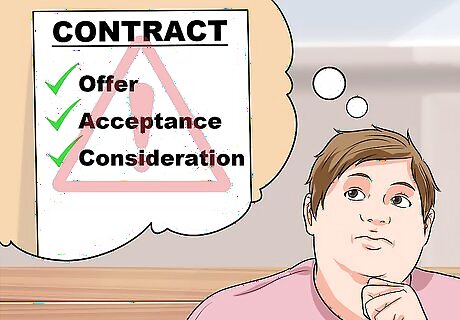
Be aware of the basic requirements of all contracts. Contracts have three essential elements: an offer, an acceptance of that offer, and sufficient “consideration,” or what each party will “get” out of the contract. The contract should be written in such a way that the parties involved clearly understand the contract without an attorney to interpret it. This will help all parties be clear about their obligations. A contract also protects everyone involved in case the contract is breached or unfulfilled.

Make sure all parties are legally able to participate. You should only form a contract with someone who has the authority to carry out the contract (like a company's owner or CEO). Furthermore, a contract will not be legally valid unless everyone involved is an adult with the legal ability, or “capacity,” to enter into a contract. Capacity is usually determined by a person’s age and mental competence. The following considerations should be taken into account. In almost all cases, a contract is not legally valid unless the parties involved are at least 18 years of age. Look up the laws in your state if you think your case might be an exception. If a minor wishes to enter into a contract, a guardian may, in some circumstances, do so on their behalf. In most states, an emancipated minor can enter into a contract as if he or she were an adult. All parties must have the mental capacity to fully understand the contract. Even an adult may not be capable of understanding what the contract requires him or her to do. For example, a person with a severe intellectual disability might be unable to understand his or her legal rights and obligations. This person could not enter into a legally binding contract. A contract is usually, but not always, void if either party is intoxicated or otherwise mentally impaired when the contract is signed. A contract is also void if it is entered under duress or coercion. For example, if a robber is holding you at gunpoint and you verbally agree to go to your bank and give him/her all your money, this is not a valid contract because both parties did not willingly enter into the agreement.

Plan to exchange something of value. In a legal contract, something of value has to be exchanged for something else of value. This benefit is called the “consideration.” It can be services, cash, goods, intellectual property, or the promise to exchange one of these items. The terms of the contract must be clear to be enforceable. For example, you could write a contract with these terms: “Sujata agrees to sell her car to Jack for $5,500 on December 13, 2014.“ It is clear who is promising to do what, and when it is to be done. Both parties agree that the exchange is fair. However, you could not write a contract with the following terms: “Shao agrees to do something, to be determined later, for Sue in exchange for Sue’s payment of whatever money she has at that point.” These terms are unclear; there is no certainty about what will be done, when it will be done, or what will be given in return. This contract is unenforceable, even if both parties have agreed to it. The consideration should be adequate in a fair contract. For example, if Joan promises to pay Dev $25,000 for a house worth $150,000, this is unlikely to be considered adequate consideration. If Joan promises to pay Dev $140,000 for a house worth $150,000, however, this would likely be considered adequate consideration because it is close to the real value of the object.

Ensure all parties are in agreement. For a contract to be legal, an offer must be made and accepted. Before you write up a contract, all parties should have the same general idea about what the contract will stipulate; this is usually in the form of “if X happens, then Y will occur.” In legal terms, this is known as a “meeting of the minds,” or mutual agreement. Having a discussion about the terms beforehand saves time, because if the information in the contract is not acceptable to one of the parties, it will have to be revised. For example, your contract may say “Mr. Smith will sell Ms. Brown his 2012 Toyota Prius in exchange for $12,000.” The price and details of the exchange were likely agreed to prior to the contract being written.

Come to an agreement in good faith. All parties must mutually assent to the terms of the contract. This means that they agree to the contract without being forced or coerced to do so. All parties should be treated fairly and honestly. All parties should do everything they can to abide by the contract's requirements.
Writing the Contract
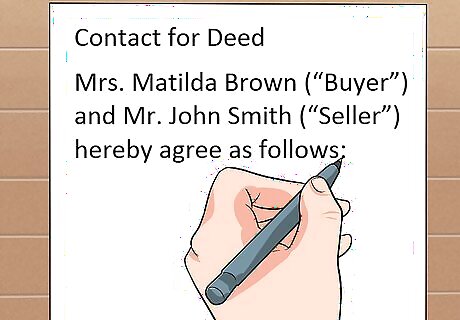
Start with basic information. Write the date at the top of the page, then write the names or company names of all parties in this format: "This contract is between ___ and ___." Contracts between businesses (or between an individual and a business) should include the business's full legal title, including designations such as "LLC" or "Incorporated." If there is other identifying information you want to include, such a person's title, include it here.

Detail the exchange of consideration. In clear, readable language that is easy to understand, describe what services or goods are being exchanged. In some cases, money may be exchanged for these goods or services. In other cases, a bartering of services or goods may be exchanged. Use short, clear sentences broken into short paragraphs. Provide a numbered heading for each paragraph to make references easier. When possible, use plain language, rather than legalese. If the parties go to court, the judge will decide the case based on how the contract would be interpreted by the average person. However, there are certain terms or phrases that have historical precedent and exact legal meaning that will facilitate a court’s interpretation of the contract. Write explicitly what one party is promising to deliver and what the other agrees to pay or do in exchange. If services are part of the deal, state what services will be performed. Specify who will perform the services, for whom, where, when, for how long and for what consideration. For example, you could write a contract with these terms: "Jane Smith agrees to copy-edit 300 pages for ABC Publishing by August 3, 2013 for a flat rate of $2,000, to be paid in full within 30 days of delivery." Or, you could write a contract that stipulates that you will mow your neighbor’s lawn once a week for two months in exchange for them helping you re-tile your roof next weekend. If you are selling real estate, provide a legal description of the property and its exact location. You may wish to have a lawyer or real estate agent help you with this. Legal descriptions of real estate have very specific requirements that can be difficult to provide on your own. When selling goods, state the color, size, make, model, delivery date, and any other identifying details.

Use addenda when necessary. You can add an addendum to your contract if you forgot to detail something in the contract or if the details of some part of the contract would be cumbersome to include in the contract itself. Addenda can be added at the time of the contract or afterwards as long as all parties to the contract sign off on (or initial) the addendum.
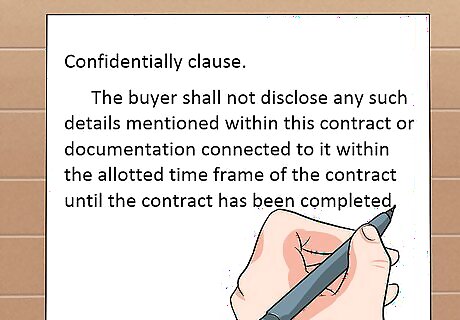
Consider adding a confidentiality clause or a Non-Disclosure Agreement (NDA). If you'd prefer the other party not to share the information in the contract with others, you can include a clause forbidding the other party from disclosing your information. Alternatively, you can have the other party sign an NDA prior to entering the contract; this ensures that they cannot share your information without facing legal action. Consider adding a mutual NDA, which would protect both parties from sharing each other's information. A confidentiality clause can protect a small business from having trade secrets exposed. A confidentiality clause may also require one party to return the other party’s information or property when the contract has been fulfilled.
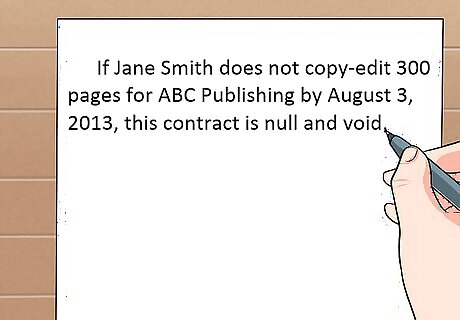
Include a clause describing how the contract will be terminated. Specify how long the contract will last. If it's for a one-time exchange of services, state that it will be terminated upon completion of the transaction. If it's a contract for ongoing services, you may want to state that either party may end the contract by giving 30 days' notice. Include language about what will happen if someone is in breach of the contract. For example: "If Jane Smith does not copy-edit 300 pages for ABC Publishing by August 3, 2013, this contract is null and void." Be aware that a minor breach of contract may not void the rest of the terms. For example, if Jane Smith was contracted to copy-edit 300 pages for ABC Publishing by August 3, 2013, but only completed 285 pages, this would likely be considered a minor breach. Because Jane Smith has completed a substantial amount of the work and appears to have made a good faith effort to fulfill the contract, it is unlikely that ABC Publishing could completely nullify the contract. However, they probably could be eligible for some sort of remedy, such as paying a lower rate. Add dispute resolution terms that specify how the issue will be handled if a breach occurs. Note who will pay attorney's fees and court costs and specify the jurisdiction of any court action (city or county and state). If the contract is for a small business, consider adding a mediation or arbitration clause, which is substantially less expensive and time-consuming than a court trial.

Make sure the contract is in accordance with the law. Research which state and federal laws might pertain to the contract so you can ensure that it is legally enforceable. For example, if the contract controls a construction project for a government body, the contract will need a clause stating the contractor will not discriminate on the basis of gender, ethnicity, religion or nationality. You cannot contract for illegal goods or services. These contracts are considered void, which means they are as if they never existed. Void contracts cannot be enforced and are not subject to remedies or damages. For example, if Fatima agrees to pay Nathaniel $100,000 for a delivery of cocaine to her home in Virginia, this contract is void because the sale and purchase of cocaine is illegal in the United States. Illegal services also cannot be contracted. For example, if you hire a blackjack dealer to run a blackjack table in a state where gambling is illegal, this contract is void. Even if both you and the dealer agree to the terms, the service is illegal, and thus you cannot contract for it.

Reserve the last page for the parties to sign and date the contract. Provide spaces for each name and spaces for the date the contract is signed.
Executing the Contract

Make an offer. When the contract is ready, send it to the other party to look over. The offer may be accepted or rejected as-is. It is also common for the other party to respond with a counteroffer, or changes that should be made before the contract is accepted. If you want to speed things along you can include a date by which the contract should be signed, addressed or rejected. Legally, the other party is obligated to respond "within a reasonable amount of time.” What counts as a reasonable amount of time is highly subjective, however. For example, if you are negotiating the terms of your employment with a company, they may require you to return your decision on their offer within a certain period of time, such as two weeks. You can revoke the offer rather than accept it. Once the offer is accepted, you've entered into a binding agreement.

Negotiate until an agreement has been reached. It's common for the parties to go back and forth with changes to the contract until they are both satisfied with the terms and the language. Haggling over the payment is the most common form of negotiation. Specify the schedule and method of payments in the contract. You may want a single lump sum, a monthly payment, or a down payment and follow-up installments. Specify if payments should be made by cash or check or if you will accept credit cards. Other negotiations might include debating provisions in a contract. For example, consider that you are buying a house. You get the contract of sale, and it has a provision that requires you to forego a building inspection to purchase the house. You might send this contract back to the seller (or seller’s agent) and request that this provision be removed.

Sign the contract. When you and the other party are both in agreement that the contract is final, sign and date the contract and have the other party do so as well. Be aware that many companies use electronic signature services such as DocuSign or Adobe Document Cloud with eSign. These electronic signatures are used in place of a written signature and are legally binding. Keep a copy of the contract for your reference, and make sure the other party (or parties) has one as well. You may want to stipulate that the contract takes effect upon signing. In other cases, you may want the contract to take effect at a certain date.



















Comments
0 comment